Munich-based rocket manufacturer Isar Aerospace will soon be transporting satellites into orbit. The environment and climate can be monitored from space. But the technology is also groundbreaking for the automotive industry. A first test flight was launched from Andøya Spaceport in Norway at the end of March 2025.
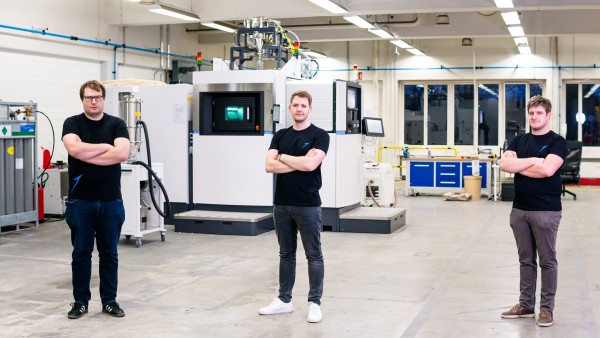
A spirit of optimism
The three founders are still there – CEO Daniel Metzler (center), CTO Josef Fleischmann (right) and Head of Combustion Markus Brandl (left).
A German start-up is at the forefront of the ambitious market for manufacturers of civilian rockets: Munich-based launch service provider Isar Aerospace. The three founders, Daniel Metzler (now CEO), Josef Fleischmann (CTO) and Markus Brandl (Head of Combustion) met each other during their studies at the Technical University of Munich. Together they undertook research on smaller rockets and performed launches as part of the Scientific Workgroup for Rocketry and Spaceflight (WARR). Back then, they were approached by companies that wanted to purchase rocket propulsion systems. The three asked themselves why the industry would want to purchase rocket engines from students – could they not make them themselves? And if they needed rocket engines, then would they need the entire launch vehicle, too? “We recognised the high demand from industry for more cost-effective and flexible rocket launch solutions”, says CEO Daniel Metzler. And so the idea for Isar Aerospace was born.
Today, the company that was founded in 2018 and located in Ottobrunn near Munich employs over 200 people from over 40 countries. The first test flight of the Spectrum launch vehicle is scheduled for 2025 from the Norwegian island of Andøya. Their customers include Airbus Defence and Space. The business hit the ground running to become one of the most important players on the market for launch vehicles and has already raised 180 million US dollars in funding. Investment holding company Porsche SE is the most recent addition to their ranks of investors. “Insurance companies, telecoms and automotive manufacturers will not be the only ones that depend on satellites”, says Metzler. “Nearly every company and every organisation will.”
Revolution in space
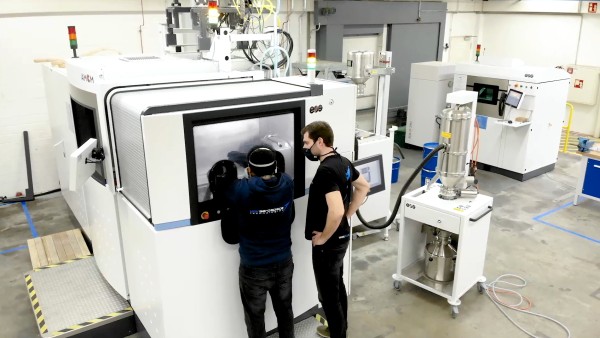
International
More than 200 employees from over 40 nations work together at Isar Aerospace on the production of innovative launch vehicles.
Isar Aerospace wants to meet rising global demand for flexible and affordable access to space. “Without space flight, we wouldn’t have services like GPS or Google Maps”, says Metzler. “Tracking ship and aircraft locations would be impossible, as would autonomous driving. Moreover, we can use satellites to ensure access to high-speed Internet all over the world.” As a result, aerospace technology is setting the pace for new business models and platforms for innovation and future technologies.
An entire sector is developing out of this field. “According to current estimates, the global market for space launch services is expected to increase to over 30 billion euros by 2027”, says Metzler. Analysts from Allied Market Research estimate that the market constituted by small and flexible rocket manufacturers will increase to 8.1 billion euros by 2027. However, only two such small commercial rockets are operational today.
By 2028, experts estimate that close to 10,000 satellites will orbit the Earth, most of them being small satellites under 250 kilograms. And this is precisely the market Isar Aerospace is targeting. For example, the satellites that the start-up plans to transport to space with the 28-metre-long Spectrum launch vehicle will circle the Earth in low Earth orbit, only 500 kilometres high. As a comparison, conventional GPS systems work with satellites that orbit at about 20,000 kilometres above the planet. The satellites are a key strategic tool for the entire automotive industry, even though it is used for transmitting data to car entertainment systems or connecting factories. But automotive manufacturers will not be the only ones dependent on satellites in future – nearly every public or private company and every organisation that works with information or complex communication technologies will need them as well.
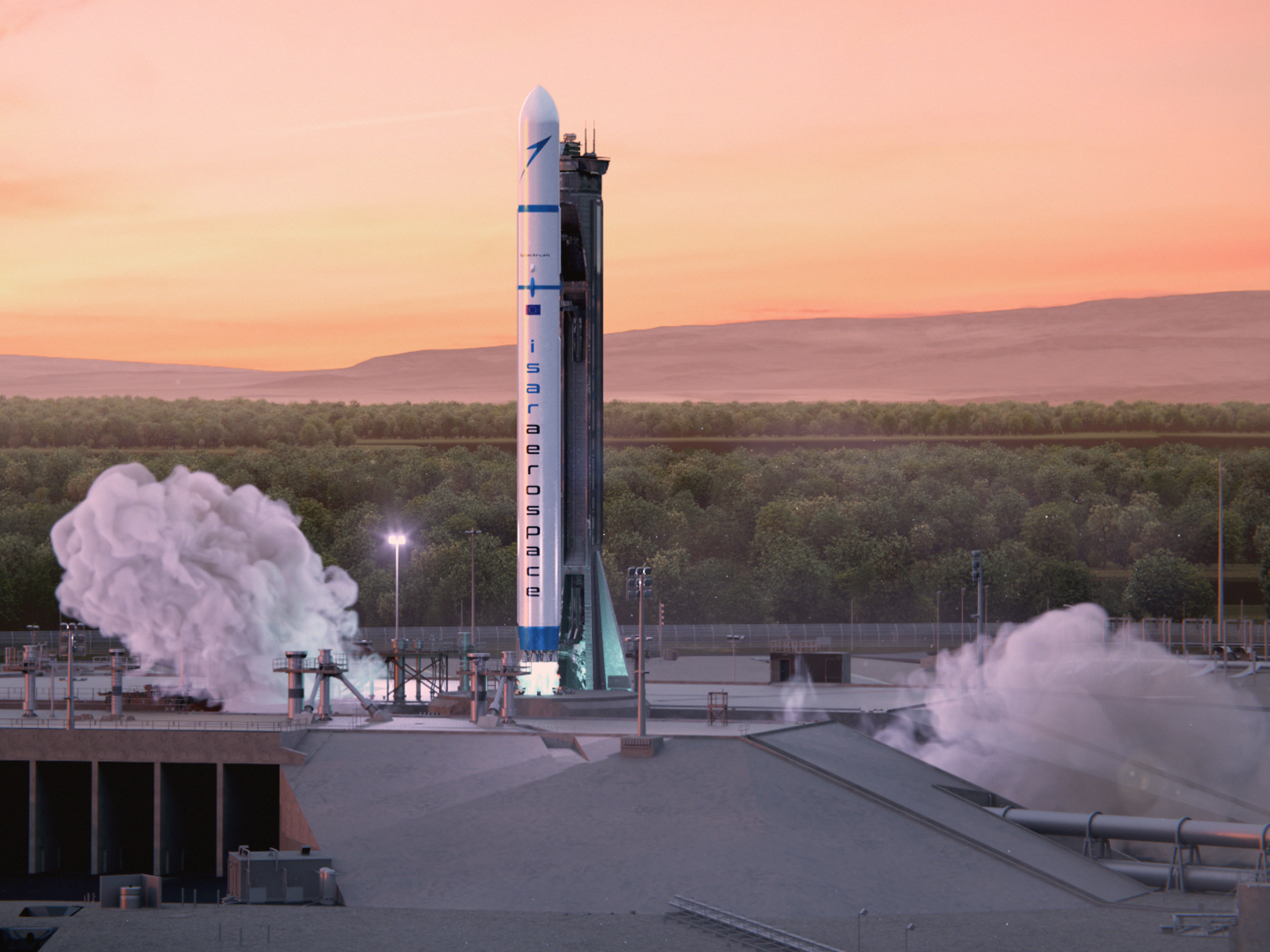
High demand
The 28-meter-long "Spectrum" launch vehicle transports satellites and payloads weighing up to 1,000 kilograms into orbit.
Forest fires and floods
The satellite images can also be used to monitor the environment; for example, by tracking global warming. “Satellites make it possible to monitor and measure changes in the Earth’s surfaces, oceans and atmosphere, then develop a plan of action to protect them”, says CEO Daniel Metzler. They can be used to quickly localise the source of forest fires or determine the extent of flooding using data in real time.
Recently, in September 2021, Isar Aerospace announced the conclusion of a launch service agreement with New Space start-up OroraTech. “Their nano-satellites will be used to help combat wildfires around the world and the global climate crisis through satellite-supported services for detecting and monitoring forest fires”, says Metzler.
Investors and supporters
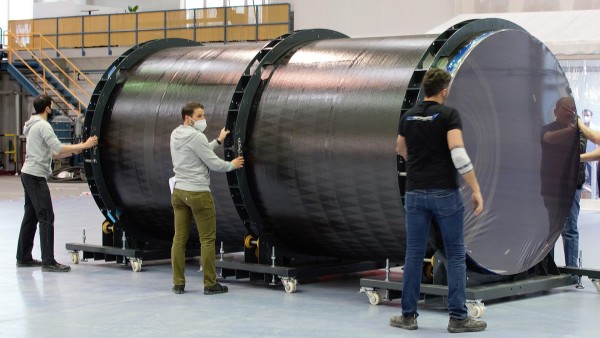
Rocket production
The components of the "Spectrum" launch vehicle are manufactured in the production hall in Ottobrunn near Munich.
Isar Aerospace was able to raise 220 million euros in the most recent funding round. In total, the start-up has already raised over 400 million euros. According to Isar Aerospace, this makes them the fastest-growing and best-financed space start-up in Europe. Experts value the company at around one billion euros. When Porsche SE, the controlling shareholder of Volkswagen, invested during the latest round of financing, it attracted attention. By this point, Isar Aerospace had already muscled its way ahead of two German competitors: Rocket Factory Augsburg and HyImpulse Technologies from Baden-Wuerttemberg.
KfW subsidiary KfW Capital invested via two venture capital funds: HV Capital and UVC. “UVC showed support for Isar Aerospace back at a very early stage as a seed investor. They believed in the team and our vision before there was much to show for it”, says CEO Metzler. “HV Capital then joined the fold as a new investor at the end of 2020 in the series B round and then significantly increased its investment in the series B extension.” Jörg Goschin, Senior Managing Director at KfW Capital, adds: “We are pleased with the cooperation with UVC Partners and HV Capital on financing for Isar Aerospace, an innovative German space tech company. Isar Aerospace is also an excellent example of how venture capital makes it possible for technologically ambitious start-ups in Germany to execute their business plans.
The investors are most pleased by the fact that Isar Aerospace has cost-effective production. A key factor here is that manufacturing is largely automated. Many of the propulsion drive components are made using 3D printers; the milling machines are partly operated by robots. Ninety per cent of their manufacturing is in-house, which is unusual for this industry. “In Europe, we are the only ones that carry out the entire value creation process in-house”, says CEO Metzler, “from design software and expertise to test facilities and production.” One launch currently costs customers around 10,000 euros per kilogram of payload – around four times less than at other small launch vehicle manufacturers.
Autonomous Europe
Isar Aerospace was in the right place at the right time. Europe is in a tight spot. Although German satellite manufacturers could launch using US rocket manufacturers, that would mean that they would depend on America. And neither businesses nor policy-makers want to repeat the mistake they made when the Internet was set up. Europeans do not want to surrender this field to the United States and become dependent again, without alternatives.
This applies in particular to data traffic. The European Commission is planning to create its own secure data communication network in space. Mobile Internet connections also use satellites, and Europe does not want to surrender this information to US intelligence services any longer. Isar Aerospace is part of the consortium which wants to operate the construction of the system under the leadership of the French start-up Rovial.. “We believe in a technologically sovereign Europe where the entire value chain originates within Europe”, says Metzler.
First test flight from the Norwegian space centre Andøya
The ‘Going Full Spectrum’ mission was launched from Andøya Spaceport in Norway on 30 March 2025. During its first test flight, the launch vehicle first had to accelerate to 28,000 kilometres per hour at take-off and was then destroyed in a controlled manner after just under a minute in flight. Over the next few months, further rockets built in Munich-Ottobrunn will be ready for the next tests.
The test flight marks the first launch of an orbital vehicle from the European mainland. The Spectrum rocket, which was developed and built entirely by Isar Aerospace, did not transport any customer payloads on this first flight. Instead, the focus was solely on gathering as much data and experience as possible.
The results of the test will be incorporated into the further development of future Spectrum vehicles, which are being built and tested in parallel. With this test flight, Isar Aerospace is endeavouring to make an important contribution to European space autonomy and to lay the foundations for independent and competitive access to space from Europe.
Published on KfW Stories on 10 December 2021, updated on 31 March 2025.
The described project contributes to the following United Nationsʼ Sustainable Development Goals
Goal 13: Combat climate change immediately
Water shortages, droughts, hurricanes and floods are just some of the many consequences of global climate change and causes of migration. Currently, about 20 million people are forced to leave their homes as a result of climate-related events. Climate change does not stop at national borders, and its impacts are not limited to individual policies, economic sectors or social groups. International efforts to mitigate climate change must also take into account the many interactions that occur between these areas. Source: www.17ziele.de

All United Nations member states adopted the 2030 Agenda in 2015. At its heart is a list of 17 goals for sustainable development, known as the Sustainable Development Goals (SDGs). Our world should become a place where people are able to live in peace with each other in ways that are ecologically compatible, socially just, and economically effective.

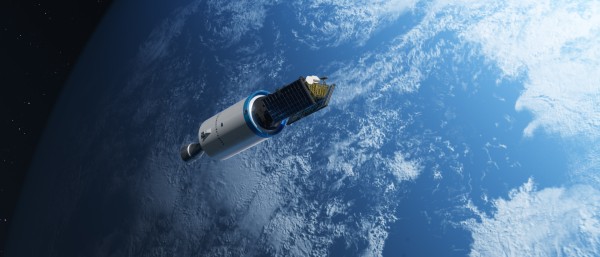


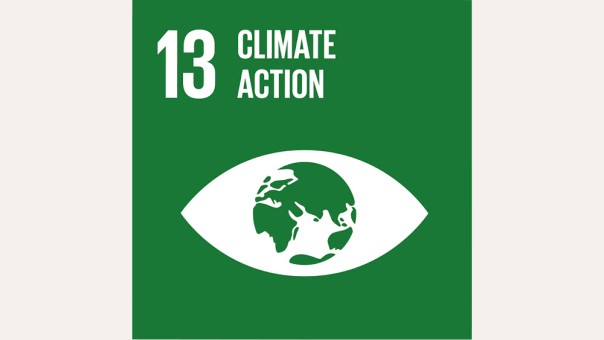


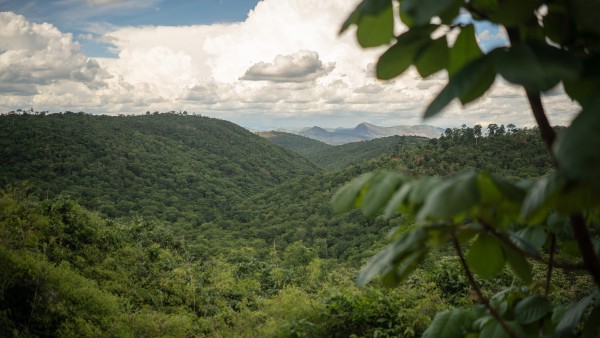
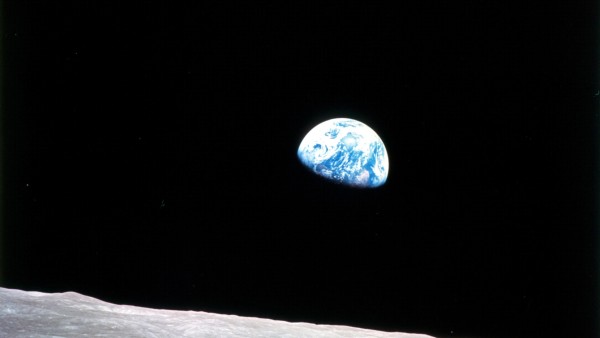
Data protection principles
If you click on one of the following icons, your data will be sent to the corresponding social network.
Privacy information